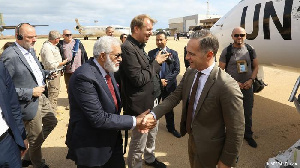The visit by Minister Heiko Maas’ is to spur efforts to resolve the country’s long-running conflict
Germany’s top diplomat arrived in Libya on Monday for a previously unannounced visit intended to spur international efforts to resolve the country’s long-running conflict.
It is Foreign Minister Heiko Maas’ first visit to Libya following a summit in Berlin in January, when world powers agreed to a peace process for the war-torn country that has largely fallen flat.
“We see a deceptive calm in Libya at the moment. Both sides and their international allies are continuing to arm the country on a massive scale and are maintaining preconditions for a ceasefire,” Maas said in a statement on his arrival.
Maas is scheduled to meet Prime Minister Fayez Serraj in the capital Tripoli in order to discuss the violent power struggle between Serraj’s internationally recognized government and military strongman General Khalifa Haftar.
Libyan Foreign Minister Mohamed Taha Siala and Interior Minister Fathi Bashagha are also to participate in the talks “about ways out of this very dangerous situation,” Maas said.
In June, forces allied with Serraj’s UN-backed Government of National Accord (GNA) regained control of several bordering areas of Tripoli from Haftar’s forces, and advanced towards Sirte, a key gateway to the country’s major oilfields in the east.
However, the situation has been at a standstill since then.
Maas said he intends to discuss a UN proposal for a possible de-militarized zone around Sirte.
A meeting is also scheduled with Mustafa Sanallah, chairman of Libya’s National Oil Corporation (NOC).
“An end to the oil blockade and a fairer distribution of oil revenues are also crucial for a solution to the conflict in Libya,” Maas said.
Germany’s mediation efforts have focused on preventing foreign intervention in the civil war, which began in 2011.
Serraj has the backing of Turkey and Qatar, while Haftar is supported by Egypt, Russia and the United Arab Emirates (UAE).
European countries are keen to see the conflict resolved, as chaos in Libya has provided ideal conditions for people-smugglers to operate in the Mediterranean Sea, bringing migrants from North Africa to Europe.
The European Union has launched the Irini naval mission in a bid to enforce a long-flouted UN arms embargo for Libya.
Meanwhile, Germany, France and Italy have launched an initiative to impose EU sanctions on individuals and companies that provide ships and aeroplanes for the transportation of arms.
Following his Libya visit, Maas is scheduled to travel onwards to Abu Dhabi, following the UAE’s agreement with Israel to establish diplomatic relations.
Maas said he plans to congratulate UAE Foreign Minister Abdullah bin Zayed Al Nahyan on the historic move, while also discussing the situation in Libya, as well as Iran, Syria, Qatar and Lebanon.
Source: GNA
 Home Of Ghana News Ghana News, Entertainment And More
Home Of Ghana News Ghana News, Entertainment And More





